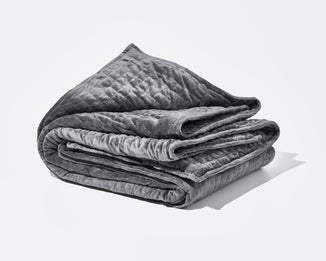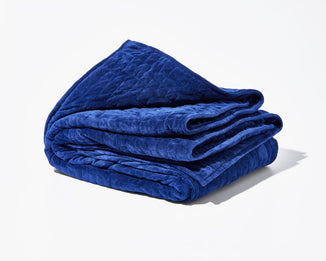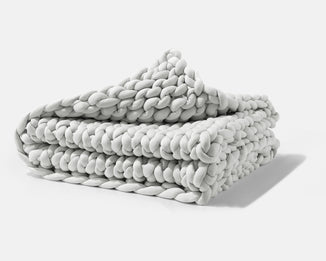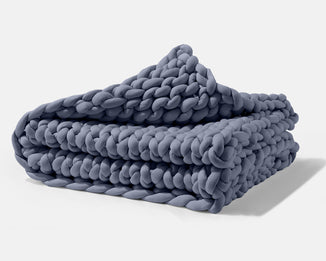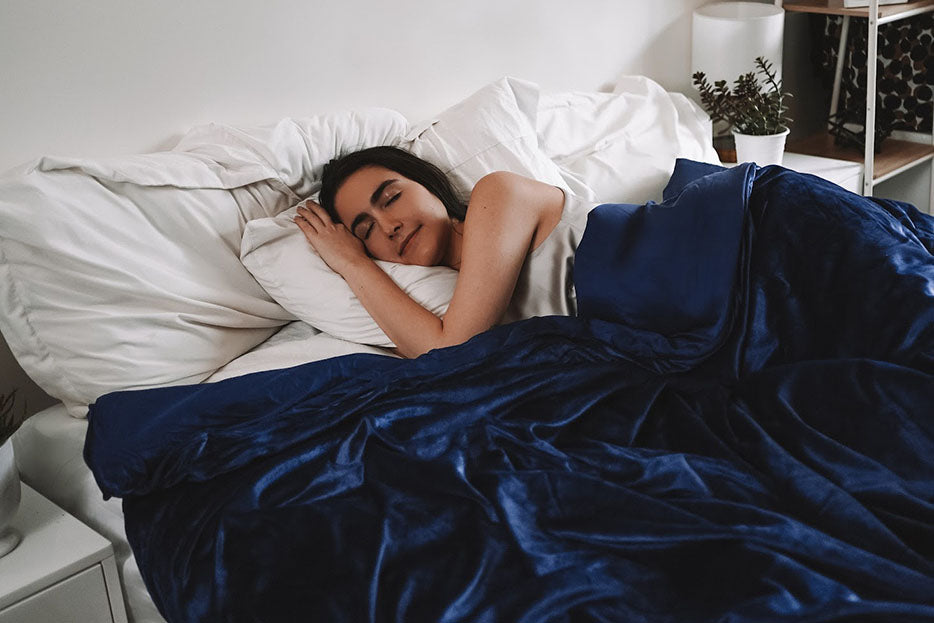
Nov 01, 2021
Using a Weighted Blanket for Depression: Everything You Need to Know
Depression is a tragically misunderstood illness. More than just occasional sadness, this all-too-common mood disorder is usually characterized by a persistent feeling of gloominess and loss of interest, which can negatively impact the person’s functioning.
If you’re one of the millions of U.S. adults suffering from depression, then you’ve no doubt come across an article or two explaining the different ways you can manage your symptoms. But today, we’d like to focus on one that you may not know about: weighted blankets.
Known for their ability to reduce stress and improve sleep, these trendy blankets are often filled with heavy materials to apply gentle, calming pressure to the body. Over the past few decades, they’ve become a popular therapeutic tool for a wide range of conditions, from anxiety to restless leg syndrome.
So, can weighted blankets really help with depression? And if so — how? Keep reading to find out everything you need to know.
Get Your Weighted Blanket Today
Weighted Blanket for Depression – How Can It Help?
If you’ve done even the slightest bit of research on weighted blankets, then you may already be familiar with how they work. Weighted blankets have a calming effect on the body, which may help ease symptoms of insomnia, stress, chronic pain and more. This calming effect uses the same principles as deep pressure stimulation, a therapy technique that applies firm, gentle pressure to trigger the body’s “rest and digest” mode.

Here are some ways weighted blankets may help ease symptoms of depression:
- Increases Feel-Good Hormones – At their most basic level, weighted blankets are designed to mimic the feeling of being hugged. When you receive a hug, you get a surge of feel-good chemicals such as serotonin and dopamine. Major depressive disorder is thought to be associated with low levels of serotonin and dopamine, so it stands to reason that weighted blankets may be beneficial for individuals with depression.
- Reduces Cortisol – Weighted blankets ground the body downwards during sleep by applying gentle pressure, which research shows can help decrease cortisol levels at night. Since cortisol levels tend to be elevated in people with depression, a weighted blanket may help improve symptoms of depression by lowering cortisol levels.
- Improves Sleep – Sleep problems usually go hand in hand with depression. In fact, an inability to sleep is one of the earliest and most common signs of depression. Weighted blankets can improve your overall sleep quality, which can help increase your energy levels and decrease mood swings.
- Provides Comfort – When we're feeling sad or lonely, we have a natural tendency to seek out cozy and comforting things. We'd say that wrapping yourself in a soothing blanket certainly fits the bill!
What Does the Research Say?
Since this is a relatively new area of study, there isn’t a lot of research on the use of weighted blankets for depression. However, it’s well known that the soothing effects of a weighted blanket can help improve sleep, especially in people with psychiatric disorders. In a recent study, researchers found that weighted blankets could ease insomnia-related symptoms in people with major depressive disorder, anxiety and other psychiatric disorders.
Other Benefits of Using a Weighted Blanket for Depression
Still not sure if you should try a weighted blanket? Here are some other benefits that may make you change your mind:
- Won’t interact with other medications. Unlike supplements and other natural remedies for depression, weighted blankets won’t cause unwanted side effects or interfere with your prescription medications. This advantage makes it a low-risk way to manage your symptoms of depression.
- Can be used in tandem with other coping strategies. Depression is a complex beast that often requires a multipronged approach. Whether you manage your symptoms by talking with a therapist, journaling or watching a funny movie on the couch, a weighted blanket is a great addition to your primary treatment.
- Encourages a basic self-care routine. Establishing a basic routine — and one that emphasizes self-care in particular — can be extremely beneficial for people with depression. Weighted blankets are easy to incorporate into your daily routine because they don’t require you to do anything except relax under their comforting weight.
How to Choose the Best Weighted Blanket for Depression
The typical rule of thumb is to choose a weighted blanket that is equivalent to 10 percent of your body weight. This weight is usually heavy enough to deliver the calming benefits of a weighted blanket without making the user feel like they can’t move under the blanket.
However, don’t be afraid to take your personal preference into account. Some people who suffer from depression have a difficult time getting out of bed. A blanket that is too heavy could make this even more difficult, so consider erring on the side of caution with a lighter weight.

Not a blanket person? Try a weighted eye mask instead. These soothing eye masks can help depression sufferers get better snooze by relaxing the body and creating a pitch-black environment — no blackout curtains required.
The Bottom Line
Weighted blankets are becoming an increasingly popular at-home remedy for a range of health conditions, including depression. But if you have underlying health issues, be sure to talk with your doctor first.
Are you ready to see what all the fuss is about? Try our best-selling Gravity Weighted Blanket and start improving your mood and your sleep today!
Your use of this website, its content, and any products obtained through this website is at your own risk. This website, its content, and any products obtained through this website are provided on an “as is” basis, without any warranties of any kind, either express or implied, including warranties of merchantability, infringement of intellectual property, or fitness for any particular purposes. No warranty or representation is made with respect to the completeness, reliability, quality, or accuracy of this website or its content. This website, its content, and any products obtained through this website do not constitute medical treatment and is not a substitute for a medical examination or diagnosis. If you are dealing with a health condition check with your health care provider before using. This website may contain affiliate links that allow us to earn a commission on purchases made through such links. We may accept forms of advertising or sponsorships in connection with this website. There might also be paid topic insertions. We may accept and keep free products, services, and other forms of compensation from others.
